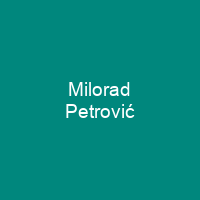Milorad Petrović was commissioned into the Royal Serbian Army in 1901. He served in multiple staff positions during the Balkan Wars. During World War I, he served in various staff roles at the army and divisional level. He was the military commander of the Yugoslav capital, Belgrade, at the time of the coup d’état in March 1941.
About Milorad Petrović in brief
 Milorad Petrović was commissioned into the Royal Serbian Army in 1901. He served in multiple staff positions during the Balkan Wars. During World War I, he served in various staff roles at the army and divisional level. He was the military commander of the Yugoslav capital, Belgrade, at the time of the coup d’état in March 1941. He urged immediate mobilisation, but this did not occur until 3 April, by which time Adolf Hitler had already issued orders for Yugoslavia’s invasion. He commanded the 1st Army Group, responsible for the country’s northern borders with Germany, Italy and Hungary. His formations were only partially mobilised by the time the invasion began on 6 April, and significant fifth column activities affected them from the outset. On 10 April, two determined armoured thrusts by the Germans caused the 1th Army Group to disintegrate, and the following day he was captured by fifth columnists. He spent the rest of the war in a prisoner of war camp in Germany. After the war, he chose to return to the newly established communist-led Federal People’s Republic of Yugoslavia, and settled in Belgrade. He lived there until his death in 1981, aged 99, and was the lifelong president of a veterans’ association for those who had participated in the 1915 withdrawal to the Greek island of Corfu.
Milorad Petrović was commissioned into the Royal Serbian Army in 1901. He served in multiple staff positions during the Balkan Wars. During World War I, he served in various staff roles at the army and divisional level. He was the military commander of the Yugoslav capital, Belgrade, at the time of the coup d’état in March 1941. He urged immediate mobilisation, but this did not occur until 3 April, by which time Adolf Hitler had already issued orders for Yugoslavia’s invasion. He commanded the 1st Army Group, responsible for the country’s northern borders with Germany, Italy and Hungary. His formations were only partially mobilised by the time the invasion began on 6 April, and significant fifth column activities affected them from the outset. On 10 April, two determined armoured thrusts by the Germans caused the 1th Army Group to disintegrate, and the following day he was captured by fifth columnists. He spent the rest of the war in a prisoner of war camp in Germany. After the war, he chose to return to the newly established communist-led Federal People’s Republic of Yugoslavia, and settled in Belgrade. He lived there until his death in 1981, aged 99, and was the lifelong president of a veterans’ association for those who had participated in the 1915 withdrawal to the Greek island of Corfu.
He had three children; two daughters, Milica and Mirjana; and a son, Branislav, who qualified as a lawyer and then worked as a correspondent for Reuters, The Guardian and Agence France-Presse in Belgrad. He went by the nickname Lord Petrović and was a member of the Serbian Academy of Sciences and Arts. He died of cancer aged 99 in 1981 in the Belgrade suburb of Zagreb, where he lived with his wife Jovanka Stojančević, a medical student. He is survived by his three children and his son Branislov, who became a judge in the Supreme Court of Cassation in Zagreb and is now a lawyer. He also had a daughter, Mila, who is married to a Croatian judge, and has three children of her own, all of whom were born in the city of Zadar, Bosnia and Herzegovina, and one of whom is a former Prime Minister of Serbia. He has a son and a daughter-in-law, both of whom are still living in Serbia. His grandson, Milorad Jr, is a Serbian politician and former prime minister.
You want to know more about Milorad Petrović?
This page is based on the article Milorad Petrović published in Wikipedia (as of Oct. 29, 2020) and was automatically summarized using artificial intelligence.







